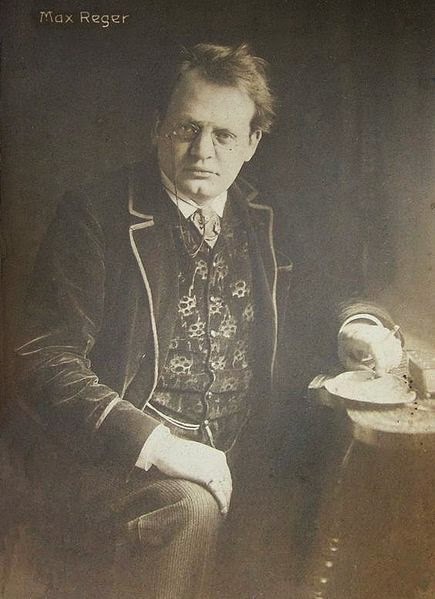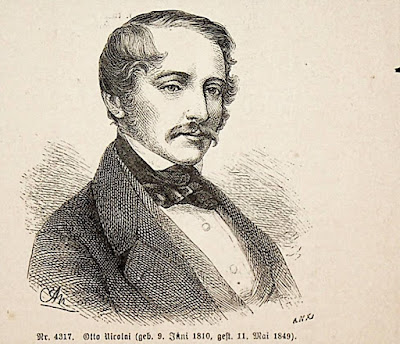Reichardt, Johann Friedrich (born in Königsberg, 1752; died Giebichenstein, 1814). German composer, conductor, and writer. Court composer and conductor to Frederick the Great and Frederick II, 1775–94. Instituted many reforms. Visited London and Paris 1785 and again some years later. Dismissed from court post for sympathy with French Revolution. Conductor Kassel Opera (Germany) 1808. Wrote at least 12 operas, Singspiele, setting of Milton's Morning Hymn, over 1,500 songs (incl. setting of Erlkönig, highly praised by Felix Mendelssohn-Bartholdy), and much chamber music. Author of several books on compostions.
It's all about the classical music composers and their works from the last 400 years and much more about music. Hier erfahren Sie alles über die klassischen Komponisten und ihre Meisterwerke der letzten vierhundert Jahre und vieles mehr über Klassische Musik.
Total Pageviews
Showing posts with label German Classical Composer. Show all posts
Showing posts with label German Classical Composer. Show all posts
Friday, February 20, 2015
Wednesday, August 6, 2014
Max Reger - His Music and His Life
The German Max Reger was born in Brand, Fichtelgebirge on March 19, 1873.
Reger experienced an incredible career up to becoming Court Conducter in Meiningen/Germany. The daily contact with a proficient orchestra trained Reger's sense, mind and meaning for colorful instrumentation.
As piano virtuoso, Reger sent his listeners into raptures because of a wonderful fine and delicate finger touch.
In my opinion Reger is the most unterrated piano composer ever. "Varations and Fugue on a theme by Bach" is probably his most famous piano work. "Thinking in fugues" - that's why his organ compositions belong to German music treasures. But also his chamber music repertory remained as unsurpassable rich. Even being a devote Catholic, Reger enriched also other creeds with varied church and organ music works.
Max Reger's lifestyle has been described as "full of deeply moral earnestness". He passed away in Leipzig on May 11, 1916.
Monday, June 23, 2014
Carl Maria von Weber - His Music and His Life
Carl Maria (Friedrich Ernst Freiherr) von Weber (November 18, 1786 in Eutin/Germany
- June 5, 1826 in London) was a German composer and key figure in the early
Romantic period. He is considered to be the founder of German Romantic
opera. He experienced a restless and fidgety youth. Mozart's youth traveled pale against that.
Von Weber started with piano lessons in 1792, and, in 1797, musical theory with the great Joseph Haydn (1732-1809). The first composition Six Fughetten has been published in 1798.
Invitation to a dance (1819) and the Concert for piano and orchestra (1821) became concessions of arising "program music", the difference to "absolute music".
A child prodigy, and touring piano virtuoso as a boy, Weber grew
up in a musical family. From an early age, he had a fascination for
opera. His major operas are Der Freischütz (1821), Euryanthe (1823), and Oberon (1826). Weber died in London of consumption less than two months after the premiere of Oberon. When his body was finally returned to Germany for burial, the eulogy was delivered by Richard Wagner.
Monday, March 3, 2014
Felix Mendelsohn-Bartholdy - His Music and His Life
The German Felix Mendelsohn-Bartholdy was born in Hamburg on February 3,1809. His grandfather Moses Mendelsohn (1729-1786) was a great German philosopher. Felix's father, the banker Abraham Mendelsohn, added his brother-in-law's family name, Bartholdy. A very rich family clan made a many-sided and all-round music education possible, including studies with Ludwig Berger, an art historian and director, and Karl-Friedrich Zelter, a musician and composer.
In 1818, Mendelsohn-Bartholdy, at the age of 9, performed already as a great piano virtuoso. In 1820, he premiered his first two youth operas "Soldier's Love" and "The Two Educationalists". After meeting the great Luigi Cherubini in 1826, Mendelsohn-Bartholdy composed the overture to Shakespeare's "One Summer Night's Dream", which became his real highlight. The other compositions of this stage play have been finished 15 years later.
In 1827, the one and only opera "Camacho's Wedding came out - and flopped.
Mendelsohn-Bartholdy loved traveling. We can notice it very well while listening i.e. the "Hebrides Overture" (Scotland) or the "Italian Symphony". During that time, his "Songs without Words" came into being: Piano pieces, sometimes arranged for violine and viola, which was the ideal house music for people in the 19th century.
Chamber music compositions ("Fine Art Quartets") and two incredible piano concerts in g-minor and d-minor, the "Scottish Symphony", the "Reformation Symphony" and the dramatic tuneful violin concert in e-minor are brilliant achievements of one of the most outstanding German classical composers.
Felix Mendelsohn-Bartholdy passed away in Leipzig on November 4, 1847.
Saturday, November 23, 2013
Paul Hindemith: Trauermusik (1936) - His Music and His Life
The German Paul Hindemith was born in Hanau nearby Frankfurt/Main on November 16, 1895 and studied with Arnold Mendelsohn (1855-1933) and Bernhard Sekles (1872-1934).
Hindemith became the first important composer coming from a string instrument since Ludwig Spohr (1784-1859). In 1915, Hindemith became concert master at the Frankfurt Opera.
Since 1922, Paul Hindemith started his incredible career as the founder of the New German Classical Music. His operas "Murders - Women Hope" (1921) and "Sancta Susanna" (also 1921) have been witnesses of Hindemith's assault on classical music. The radicalizing "Piano Suite 1922" has been denied categorically. Hindemith's compositions have been remained as a matter of taste. His book "A Composer's World - Horizons and Limitations", published in 1952, seems like a stylish report or even justification.
Paul Hindemith passed away on December 28, 1963 in Frankfurt/Main.
Friday, July 12, 2013
Max Bruch - His Music and His Life
The German Max Burch was born on January 5, 1838 in Cologne. His mother was his first emotional music teacher.
At the age of 11, Bruch composed his first classical piece, simple entitled as OPUS 1. When he became 14, his first symphony premiered in Cologne.
After his father's death, Bruch got an insatiable thirst to travel around the whole world, which facilitated him many important and fruitful meetings with society personalities from politic, culture and clergy.
His ever best stage play, the opera "Lorely", premiered 1863 in Mannheim, Germany. Melodic and tuneful folksong atmosphere and E. Geibel's soft-emotional script are the reasons of this never forgotten highlight of Max Bruch.
Bruch's most valid orchestral works have been his "First violin Concerto in g-minor" from 1868; "The Scottish Fantasy" and -one of my favourites- "Variations Kol Nidrei for cello and orchestra".
He received innumerabe honors, praises and musical awards. Even being very contrapuntally, Bruch remains as a very special classic composer in the hearts of real music lovers.
Bruch passed away in Berlin on October 2, 1920.
Monday, June 10, 2013
Paul Lincke - His Music and Life
Born on November 7, 1866 in Berlin, the German Paul Lincke has become a popular composer.
Lincke's father was a known and successful municipal authorities civil servant. In Wittenberg's Piper College in Eastern Germany, Paul Lincke studied violin and bassoon play.
Then, Linncke became the Director General of the Berlin Apollo Theater.
1897 marked Lincke's first big stage success with a during those times so called "equipment revue" entitled "Venus on Earth". National traditions mixed with a unique and real "Berlinian operetta sound" has been the reasons of Lincke's entire success: "Frau Luna" (Madame Luna, 1899), "Lysistrata" (1902, with the evergreen "The glimmering glow-warm", one of my late grandmother's favourites), or "Casanova" (1914, badly on stage, because World War I just started).
"Berliner Luft" (Air from Berlin) remained as unofficial anthem of Berlin till today.
Paul Lincke passed away in Clausthal-Zellerfeld on September 3, 1946.
Friday, January 25, 2013
Otto Nicolai - His Music and Life
Born on June 9, 1810 in Königsberg, Germany/Poland, Otto Nicolai passed away in Berlin on May 11, 1849.
At the age of 16, he left his parental house because he thought he mind find his personal fulfilment and luck by travelling to foreign countries.
A generous sponsor facilitated a music study with Karl-Friedrich Zeller (1758-1832) in Berlin. In 1833, Otto Nicolai became organist at the German Legation of Rome. He started composing operas following the typical Italian style. "Il Templaro" (1840) became his greatest success.
The premiere of "The Merry Wifes from Windsor" ("Die lustigen Weiber von Windsor" - 1849) impressed all classical music lovers with wonderful melodies and grateful opera parts. Nicolai could enjoy an over-whelming appreciation only for two months (!), because he passed away surprisingly.
During the 1930s a rebirth of his music works has been without success. What a pity!
Friday, October 5, 2012
Johannes Brahms - His Music and Life
Brahms became a contra-bass-player and respected horn player. As a young boy Brahms earned his livings by performing in different sailor saloons and dives.
After wretched and puny school years he did try to build up a higher education through self-confidence and self-study. Brahms surprisingly drew people's attention to his impressing piano playing, especially when he accompanied the Hungarian violinist Eduard Remeny on virtuoso touring.
In 1858, Brahms became Musical Director in Detmold/Germany. In 1863, Brahms has been in charge of the Vienna Academy of Music. As freelance artist Brahms lived a carefree life. Schubert had been forced to it, Beethoven succeeded in doing at the beginning.
The Piano was Brahms' source of composing work. He could fulfill a sonata's gigantic measurements and extents. Richard Wagner and Johannes Brahms have been the "Children of Romanticism", but only Brahms has lacked the pathos of theatrical language and expressionism. But, Brahms' compositions have become a world power - equal to Beethoven and Wagner.
This space doesn't allow mentioning the whole life's work of an incredible German classical composer named Johannes Brahms.
More in my next post about him.
(To be continued!)
Subscribe to:
Comments (Atom)
.jpg)






